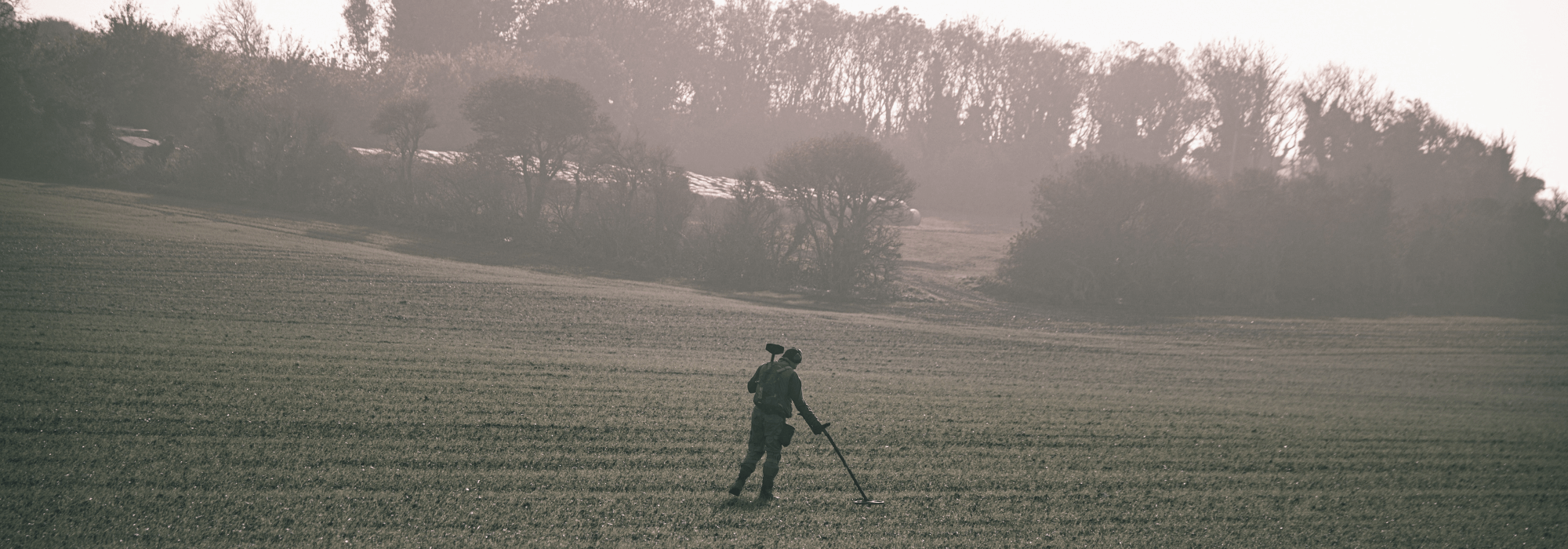
Recently, friend of The Royal Mint, Alex Lemaire, got in touch to share a story about the Leominster Hoard. This was when two paramedics, Jeremy Daw and Martin Fulloway who enjoy metal detecting during their spare time found a huge 518 Roman coins in Leominster, Herefordshire, UK. We really enjoyed reading Alex’s story and it got us thinking about metal detecting as a hobby.
Metal detecting, or treasure hunting, can be a satisfying hobby; relaxing and therapeutic, letting you spend some time exploring the great outdoors. However, nothing can beat the thrill of discovering something.
Many hobbyists have discovered hordes of treasure which made them rich and famous; but is this the only fascination behind the hobby or are there other reasons?
In this blog post we explore treasure hunting, some of the most popular methods and notable finds.
Treasure Hunting
The phrase ‘treasure hunting’ originated as a definition for the professional excavation of lost valuables, predominantly by archaeologists. The founding father is thought to be Heinrich Schliemann, a German businessman and pioneer in the field. He discovered the site which was recognised as ‘Troy’ (located in present-day Turkey) in 1870. The land was first envisioned by Greek poet, Homer, who popularized the lost city within his writing. No one knew if Troy was a true place until Schliemann proved its existence.
Since the Troy revelation, many inspired by Schliemann’s success have followed in his footsteps, searching for both fame and fortune. Some of the most notable discoveries in the past one hundred years include Howard Carter’s infamous discovery of pharaoh Tutankhamen in 1922. More recently, in 1985 Mel Fisher found $450m worth of gold and silver in a 1622 Spanish ship, the Nuestra Senora de Atocha.
Buried Treasure
Discoveries of large quantities of buried coins have captured the public’s attention and caches of coins can date as far back as ancient times. It’s common for coins to form an important part of a burial site, but they can also go back to times of strife, where people have felt the need to secure their wealth by burying it underground. Whilst it’s fascinating to speculate, we may never know why the owners never returned to retrieve their carefully guarded treasure troves.
We’ve seen metal-detecting and treasure-hunting increase in popularity over the past decade and 2012-2017 saw the number of recorded treasures rise by 28.7% (GOV); this increase can be linked to two popular discovery mechanisms: coin roll hunting and metal detecting.
In 2008, metal detecting duo Michael Darke and Keith Lewis located 840 gold coins in Wickham, worth £315,000. Dave Crisp followed this success in April 2010, unearthing a hoard of 50,000 Roman Coins worth £320,000. In 2017, the ‘Frome Hoard’ was voted the ‘UK’s top treasure hoard over the last 20 years’ by Telegraph readers. It consisted of over 52,000 silver and bronze coins dating between AD 250 to 290. They were purchased by the Museum of Somerset in 2011 for £320,000.
In recent news, a couple found one of the largest hoards in the UK. They uncovered 2,600 ancient coins worth around £5m. Metal detecting is an easy means of finding coins due to the nature of the materials, which usually are either copper, nickel or bronze. Parks, playgrounds and beaches are typical locations to search, however, visiting rural areas which surround historic landmarks are likely to unravel valuable treasure.
Coin Hunt
You can even search in your day to day life. Check the change you receive from shops, parking meters, self-service checkouts – anywhere you collect change. To get large quantities of change visit a car boot sale, or set-up your own stall making sure to check the change for coins that may have different designs. From the Great British Coin Hunt to the Paddington and Beatrix Potter designs, there are plenty of collections out there waiting to be discovered.
If, however, you prefer the idea of making discoveries in the comfort of your own home, coin roll hunting could be for you – purchasing rolls of coins at the bank and sorting through them.
If you think you may have found something valuable, Collector Services at the Royal Mint can help to advise on the value and next steps, they can be contacted here.
Happy hunting!
Discover great stories from history and how we're celebrating these moments within The Royal Mint
Read more
